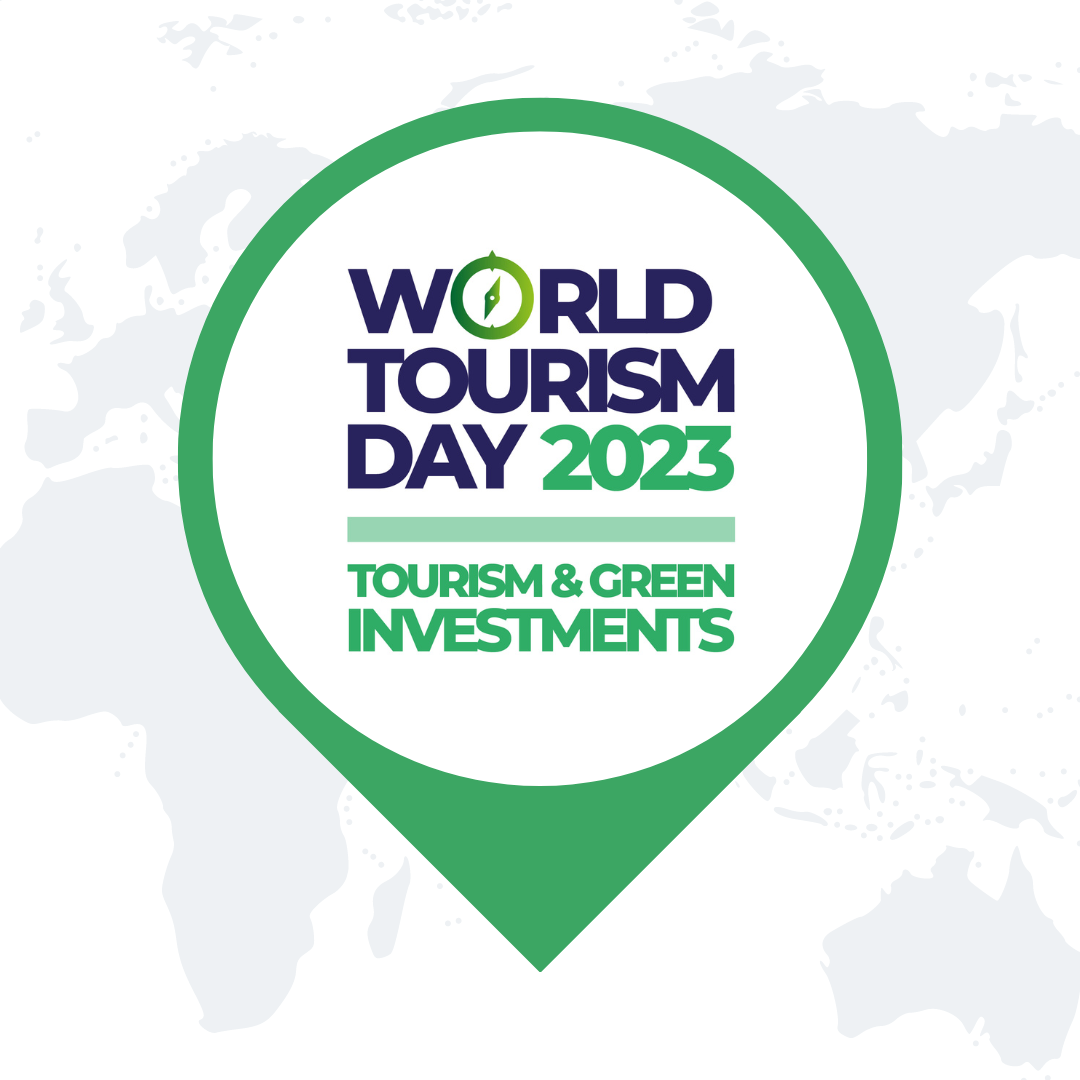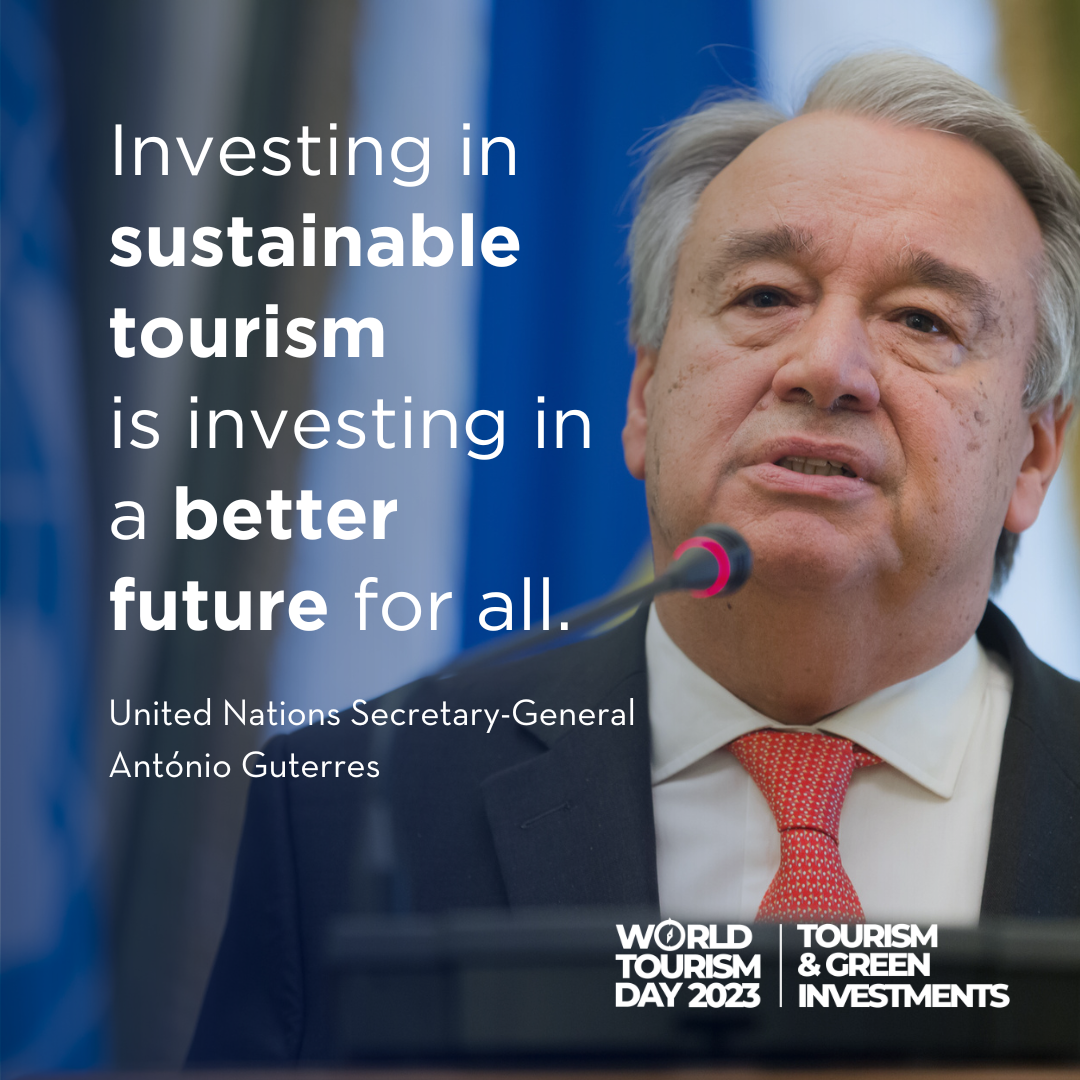We dedicated today to recognizing the critical role of tourism in society and the global economy, and have been celebrating World Tourism Day every September 27th since 1980. The aim is to raise awareness on the economic, political, social, and cultural value of tourism. With these objectives in mind, World Tourism Day highlights ways tourism can be instrumental in advancing the Sustainable Development Goals (SDGs) in the United Nations (UN) 2030 Agenda for Sustainable Development.
 This year, the World Tourism Organization (UNWTO) designated the theme for World Tourism Day 2023 as “Tourism and Green Investments.” The theme was selected to meet the pressing need for increased and more targeted investments in line with the SDGs and UN roadmap for a better world by 2030.
This year, the World Tourism Organization (UNWTO) designated the theme for World Tourism Day 2023 as “Tourism and Green Investments.” The theme was selected to meet the pressing need for increased and more targeted investments in line with the SDGs and UN roadmap for a better world by 2030.
The UNWTO, a UN specialized agency, promotes sustainable tourism development through global efforts to foster sustainable tourism through innovation, entrepreneurship and digital transformation while supporting the startup ecosystem. As stated by UN Secretary General Antonio Guterres, “there is no time to waste. Let us rethink and reinvent tourism together, deliver a more sustainable, prosperous, and resilient future for all.”
The approach this year for UNWTO centers on reshaping the direction and narratives of tourism investments to create a more sustainable future for the people (education), the planet (sustainability), and prosperity (youth and innovation).
The 2023 theme closely aligns with Goal 13 of the SDGs: “Take urgent action to combat climate change and its impacts.” As the UN explains, climate change is predominantly driven by human activities. It poses a threat to the planet and its inhabitants.
At ICAO, to minimize the adverse effects of international civil aviation on the global climate, we actively formulate and adopt policy development and Standards and Recommended Practices (SARPs) to mitigate the impact of the sector. and we conduct outreach activities to present this work.
These activities related to the environment strategic objective are conducted by the ICAO Assembly, Council and its Committees, including the Committee on Aviation and Environmental Protection (CAEP). ICAO also closely collaborates with other UN bodies and international organizations in pursuit of these activities.
 One important initiative is our State Action Plan that was launched in 2010. 140 States, representing 98.53% of global revenue tonne kilometres have voluntarily submitted their State Action Plans to ICAO as of today, using the tools available through the initiative. We invite States to regularly update their State Action Plan in line with Assembly Resolution A41-21 . It empowers them to devise long-term strategies for addressing climate change in the international aviation section, involving all interested stakeholders at a national level. We assist our 193 Member States with the development of their State Action Plans through a series of guidance documents and quantification tools.
One important initiative is our State Action Plan that was launched in 2010. 140 States, representing 98.53% of global revenue tonne kilometres have voluntarily submitted their State Action Plans to ICAO as of today, using the tools available through the initiative. We invite States to regularly update their State Action Plan in line with Assembly Resolution A41-21 . It empowers them to devise long-term strategies for addressing climate change in the international aviation section, involving all interested stakeholders at a national level. We assist our 193 Member States with the development of their State Action Plans through a series of guidance documents and quantification tools.
States are encouraged to include in their SAP a quantified baseline scenario and select relevant emissions mitigation measures from our Basket of Measures, and calculate the expected results of their implementation. Such measures include aircraft technology improvements, operational improvements, sustainable aviation fuels (SAFs), and market-based measures such as Carbon Offsetting and Reduction Scheme for International Aviation (CORSIA). CORSIA, in particular, complements the Basket of Measures by offsetting CO2 emissions that cannot be reduced through technological and operational improvements, and SAFs (in-sector measures), using CORSIA eligible emissions units from the carbon market.
Assembly Resolution A41-21 also adopted the collective long-term global aspirational goal (LTAG) for international aviation of net-zero carbon emissions by 2050, in support of the Paris Agreement’s temperature goal. The LTAG recognizes the diverse and respective capabilities of each Member State and that this will inform the State’s ability to contribute to the LTAG within its own national timeframe. Each State will contribute in accordance with its national circumstance to achieving the goal in a socially, economically, and environmentally sustainable manner. ICAO has successfully partnered with international organizations to secure funding for technical assistance projects that support Member States with their actions to reduce aviation emissions.
“Tourism and Green Investments” underscores the global commitment to addressing the pressing challenge of climate change within the tourism and aviation sectors. We have to transform how we as a society consume, produce, and travel. Tourism and green investments might bring challenges, but the opportunities can pave the way for a more sustainable, prosperous, and environmentally conscious world.

